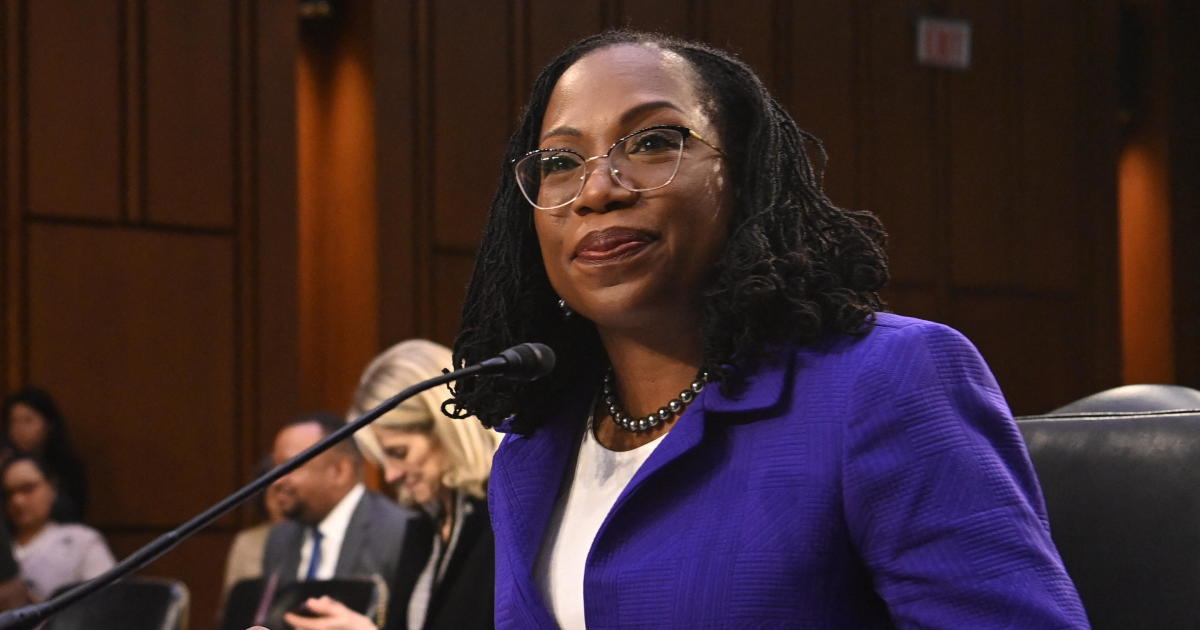Jackson was sworn in by Durbin just after 3:20 p.m. and delivered her opening statement to the committee, pledging to support and defend the Constitution if confirmed to the Supreme Court.
“Members of this committee,” she said, “if I am confirmed, I commit to you that I will work productively to support and defend the Constitution and this grand experiment of American democracy that has endured over these past 246 years.”
Noting her nearly 10 years serving on the federal bench, Jackson said she takes seriously her responsibility to be independent.
“I decide cases from a neutral posture,” she told the committee. “I evaluate the facts, and I interpret and apply the law to the facts of the case before me, without fear or favor, consistent with my judicial oath.”
Jackson offered gratitude to Mr. Biden for the “confidence” he placed in her and thanked the 45 senators she met with in the lead-up to her confirmation hearings.
“Your careful attention to my nomination demonstrates your dedication to the crucial role that the Senate plays in this constitutional process. And I thank you,” she said.
Born in Washington, Jackson highlighted the lessons instilled in her by her parents, Johnny and Ellery Brown, who were both in attendance. Jackson said her father helped stir her interest in the law, as he was a full-time student at University of Miami Law School when the family moved to Florida.
“My very earliest memories are of watching my father study — he had his stack of law books on the kitchen table while I sat across from him with my stack of coloring books,” she said.
Jackson said her parents impressed upon both her and her brother, Ketajh, the value of public service, with her younger brother working as a police officer before joining the Army following the September 11, 2001, terror attacks.
“Even prior to today, I can honestly say that my life had been blessed beyond measure,” she said. “The first of my many blessings is the fact that I was born in this great nation, a little over 50 years ago.”
Turning to her experience as a federal judge, Jackson noted her opinions tend to be lengthy, which she said reflects her commitment to being transparent and providing a thorough explanation of her decisions.
“All of my professional experiences, including my work as a public defender and as trial judge, have instilled in me the importance of having each litigant know that the judge in their case has heard them, whether or not their arguments prevailed in court,” she said.
Jackson acknowledged her family in attendance at the hearing, including her husband Patrick, daughters Talia and Leila, parents, brother, in-laws, and three college roommates.
Honoring Breyer, for whom she clerked on the Supreme Court, Jackson called it “extremely humbling to be considered for Justice Breyer’s seat, and I know that I could never fill his shoes. But if confirmed, I would hope to carry on his spirit.”
“I know that my role as a judge is a limited one, that the Constitution empowers me only to decide cases and controversies that are properly presented, and I know that my judicial role is further constrained by careful adherence to precedent,” she said.
Jackson said that across her judicial career, she has worked to ensure the words inscribed above the entrance to the Supreme Court “equal justice under law are a reality and not just an ideal.”



